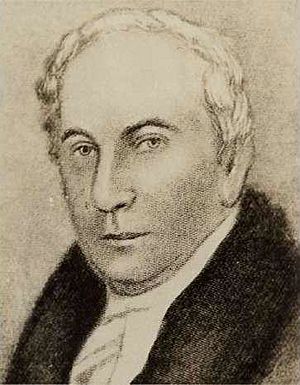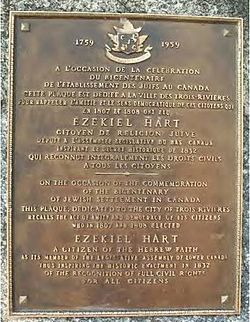Ezekiel Hart facts for kids
Quick facts for kids
Ezekiel Hart
Esq.
|
|
|---|---|
 |
|
| Personal details | |
| Born | 15 May 1770 Trois-Rivières, Province of Quebec |
| Died | 16 September 1843 (aged 73) Trois-Rivières, United Province of Canada |
| Spouse |
Frances Lazarus
(m. 1794; died 1821) |
| Occupation | Entrepreneur, politician |
Ezekiel Hart (born May 15, 1770 – died September 16, 1843) was an important entrepreneur (a person who starts and runs a business) and politician in early Canada. He is famous for being the first Jew elected to a public government job in the British Empire.
He was chosen twice by the people of Trois-Rivières to be a member of the Legislative Assembly of Lower Canada. This was a big deal, but some members stopped him from taking his seat. They said that because he was Jewish, he couldn't take the special promise (called an oath of office) which included the words "on the true faith of a Christian."
Contents
Ezekiel Hart's Early Life
Ezekiel Hart was born on May 15, 1770, in Trois-Rivières, Quebec. His parents were Dorothea Judah and Aaron Hart. His father was a well-known and successful businessman in Lower Canada.
Ezekiel got some of his education in the United States. He also served as a colonel in the local army (called the militia) during the American Revolutionary War. In 1792, he started working with his father in the fur trade.
On January 29, 1794, Ezekiel married Frances Lazarus. A few years later, in 1796, Ezekiel and his brothers Moses and Benjamin started a brewery (a place that makes beer) in Trois-Rivières. It was called the M. and E. Hart Company. Ezekiel was a partner for only a few years. After that, he worked in buying and selling goods from other countries. He also owned a general store and bought a lot of land.
The Big Challenge: Taking His Seat
On April 11, 1807, Ezekiel Hart was elected to the Legislative Assembly of Lower Canada. He won against three other people, getting 59 out of 116 votes. This was a very important moment!
However, there was a problem. The election happened on Shabbat, which is a holy day for Jewish people. So, Hart did not take his promise (oath) right away. He waited until the assembly session started in Quebec the next January.
The Oath Controversy
When Hart went to take his seat on January 29, 1808, he caused a big stir. As a Jewish man, he swore his oath on a Tanakh (the Jewish holy book) instead of a Christian Bible. He also kept his head covered, as was the custom for Jews when swearing oaths in court.
The very next day, the attorney general, Jonathan Sewell, raised an objection. He said that the oath was not taken in the right way for someone to be in the assembly. The law required an oath that included swearing "on the true faith of a Christian."
Efforts to Remove Hart
Soon after, Thomas Coffin, who came in second in the election, asked the assembly to remove Hart. He argued that as a Jew, Hart could not be elected or take the required oaths. He wanted the election to be cancelled and for him to get the seat instead.
Newspapers also got involved. One newspaper, Le Canadien, published a poem that made fun of choosing a Jew for the assembly. Many letters were published that were against Jewish people. Some even said the voters of Trois-Rivières should be told off for electing a Jew.
The Governor-General, Sir James Henry Craig, tried to help Hart. But the assembly still decided to remove him.
Hart then told the assembly that he believed his oath was legal. He also said he was willing to take the oath in the same way as others elected to the assembly. But after thinking about it, on February 20, 1808, the assembly voted 35 to 5 that "Ezekiel Hart, Esquire, professing the Jewish religion cannot take a seat, nor sit, nor vote, in this House."
Re-election and Second Expulsion
In 1808, new elections were held. Once again, the people of Trois-Rivières chose Hart as one of their representatives. This time, to avoid problems, Hart took the oath in the same way as a Christian.
However, when he presented himself to the assembly, Pierre-Stanislas Bédard, a leader in the assembly, argued against letting Hart take his seat. He claimed that Jewish people "do not wish to be part of any country" and cannot promise loyalty to any other leader while waiting for their own leader.
When the assembly met again in 1809, Hart sat as a member for a few days. But after checking that he had been expelled the year before, the assembly voted to expel him again.
These events from 1807 to 1809 are known as the Hart Affair. Some historians say it was more about the rivalry between English and French groups in Lower Canada than about being against Jewish people. Others see it as proof of ongoing dislike towards Jews among French Canadians. Ezekiel Hart himself believed that most of his opponents were Catholic and were encouraged by their priests to vote against him.
Later Life and Important Changes
After being expelled twice, Hart did not run for public office again. He continued to live in Trois-Rivières. He was a very successful businessman and a respected member of his community.
During the War of 1812, he served in the militia as a lieutenant. He was later promoted to colonel in 1830. His wife, Frances, passed away on April 21, 1821.
Jewish Emancipation Act
On June 5, 1832, something very important happened. Thanks largely to Hart's efforts, the Legislative Assembly of Lower Canada passed a new law. This law, called the 1832 Emancipation Act, gave full rights to people who practiced the Jewish faith. This was only the second place in the British Empire to do so, after Jamaica.
Interestingly, Louis-Joseph Papineau, who was a powerful speaker in the Assembly, had supported Hart's expulsion in 1809. But later, he helped pass this important law. Ezekiel's son, Samuel Becancour Hart, also played a big part. He and other important Jewish figures sent a letter to King William. They asked the Legislative Assembly to allow Jews to hold public office.
Many of Hart's family members were also important. His brother Benjamin was a major businessman in Montreal. Because of his work, Jewish people were allowed to build a new synagogue (a Jewish house of worship). They could also keep official records of births, marriages, and deaths in their community. His cousin Henry Judah was later elected to the Legislative Assembly of the Province of Canada.
Ezekiel Hart's Death
Ezekiel Hart died on September 16, 1843, in Trois-Rivières. He was 76 years old. He was such an important person in the community that all the stores in Trois-Rivières closed for his funeral. The local army regiment also honored him. He was buried in the second Jewish cemetery in Trois-Rivières.
At the time of his death, he lived in a very large house with 16 rooms. He had ten children: Samuel Becancour, Harriet, Aaron Ezekiel, Esther Elizabeth, Miriam, Carolina Athalia, Henry, Julia, Abraham Kitzinger, and Adolphus Mordecai.
In October 1909, Ezekiel Hart's remains and others from the Jewish cemetery in Trois-Rivières were moved to Montreal's Mount Royal Cemetery.
Remembering Ezekiel Hart
- The Hart family's old papers are kept at the American Jewish Historical Society Archives and the McCord Museum in Montreal. There is also a painted picture of him at the Château Ramezay.
- A short play about Ezekiel Hart's life, called The Member from Trois-Rivières, was written in 1959.
- A short film called a Heritage Minute about the Hart Affair was made and shown in the 1990s.
- In 2002, a special commemorative plaque was put up to honor Ezekiel Hart by the Historic Sites and Monuments Board of Canada. Another plaque was put up at the Patrimoine de Trois-Rivières.
- A street in Trois-Rivières is named after him (Rue Hart).
See also
- History of the Jews in Canada
- Legislative Assembly of Lower Canada
 | Stephanie Wilson |
 | Charles Bolden |
 | Ronald McNair |
 | Frederick D. Gregory |


